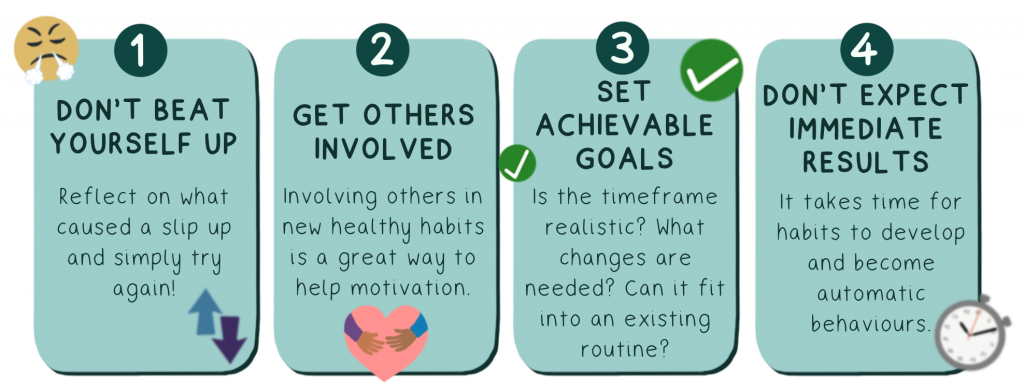
By Stephanie Baker, RNutr
Senior Consumer Nutrition Manager, Danone UK & Ireland
A recent survey from Actimel highlighted that historically 43% of adults have managed to maintain a New Year’s resolution for just three to four weeks or less! Resolutions are frequently centered around improvements to health with 32% of adults surveyed claiming that they’ve made a resolution in the past to better support their immune system. Let’s explore further why extreme New Year’s resolutions often don’t end in lasting change and whether focusing instead on implementing little daily habits is a more sustainable way to make lifestyle changes stick.
‘New Year, New Me?’ Why can New Year’s resolutions be unsuccessful?
The start of a new year is often synonymous with setting ambitious goals. The tradition to express New Year’s resolutions is deeply rooted in Western civilisation, when the change of one year into another offers a given opportunity to change lifestyle. A recent survey from Actimel informs us that 2023 is no exception, with 86% of respondents intending to pursue at least one activity or tactic this year with the aim of promoting a healthy immune system. Other popular resolutions relate to physical activity, weight loss and eating habits.
Unfortunately, over ambitious lifestyle change goals can often be unrealistic and therefore not sustainable, with just 4% of resolutions still being maintained at six months in some cases.
What are healthy habits?
 Within psychology, habits are defined as automatic behavioural patterns, in response to a situation in which the behaviour has been performed repeatedly and consistently in the past. When a new action is performed, an association develops between the environmental cue and action, and repetition of this action reinforces and establishes this association in our memory. Habits will strengthen over time and eventually become automatically activated, following increased repetition of the behaviour.
Within psychology, habits are defined as automatic behavioural patterns, in response to a situation in which the behaviour has been performed repeatedly and consistently in the past. When a new action is performed, an association develops between the environmental cue and action, and repetition of this action reinforces and establishes this association in our memory. Habits will strengthen over time and eventually become automatically activated, following increased repetition of the behaviour.
Successful health behaviour change is often a long-term process defined by the initiation and repetition of a health promoting behaviour over time. A study found the average time to develop a healthy habit was 66 days, however this can vary widely between individuals.
In relation to the recent COVID-19 pandemic, findings from recent research indicates that the formation of healthy habits can help in maintaining health. Faced with the possibility of similar future pandemics, without vaccines or specific treatments of proven efficacy, an individual’s immune system becomes the most important line of defence. Further emphasising the importance of investing in healthy lifestyle habits which support the immune system, such as routine physical activity.
Tips to maintain healthy habits
Once a healthy habit has been established, it becomes an automatic behaviour. The benefit of this is that, over time as the habit develops, it requires less motivation or conscious thought. The healthy habit becomes integrated into daily routine and is therefore more likely to be sustainable.
Maintenance of healthy habits is by no means an easy task, individuals can frequently fall back to old habits when confronted with situations conducive to those old habits.
So what are some top tips for maintaining healthy habits longer term?

- Set achievable goals
The following questions can help with setting achievable goals and supporting the formation of healthy habits.
- Is the timeframe realistic?
- What are the specific changes needed to make the goal achievable?
- Can the healthy habit be integrated around other commitments?
- Don’t expect immediate results
It takes time for healthy habits to develop and become an automatic behaviour. Don’t be disheartened if it takes some time for a healthy habit to feel like a habit! Consistency is key.
- Get others involved
Research shows that individuals attempting to change health behaviours may be positively influenced by significant others.
Involving others when developing a healthy habit is a good way to help with motivation. This could include finding a colleague to go on a post-lunch walk with during the work week or finding a workout buddy.
- Don’t beat yourself up
Reflect on what’s caused the slip up to try and recognise the environmental cues for the future and simply try again.
Little daily habits to support the immune system in the winter months
A recent survey and report co-authored by leading immunologist and author Dr Jenna Macciochi found that nearly three quarters (69%) of the UK nation do not think their immunity is up to scratch. The change in seasons gives us the impetus to give our immune systems some much needed TLC!
See here some of Dr Jenna’s top tips for maintaining a healthy immune system and some additional ways to integrate little daily habits into a routine.
- Supplement sensibly
While eating a healthy and balanced diet provides many immune supportive nutrients, some benefit from eating foods fortified with essential vitamins and minerals. Others may also require a daily supplement of vitamin D if they’re at risk of not getting enough, this includes those that are not outdoors much or are in an institution like a care home. Government advice is that everyone should consider taking a vitamin D supplement during autumn and winter in the UK.
Healthy habit: Find a fortified food enriched with vitamin D which you find tasty and can consume daily to support in helping you achieve your daily dose of vitamin D.which can be incorporated into the diet. These could include yoghurt drinks, fat spreads or breakfast cereals but check the label to ensure they’re fortified with vitamin D as some brands may not be.
- Move more
Physical activity is proven to support the immune system. We should all be avoiding extended periods of sitting down. Even those who manage to exercise multiple times a week, yet spend hours a day sat in front of their laptop at work can still be considered inactive.
Healthy habit: Integrate daily movements into routines such as a little morning dance when brushing teeth, doing a few desk stretches in between meetings or walking up and down the stairs in between work calls.
- Prioritise sleep
Preferably 7-9 hour of sleep is important for keeping immune cells primed and ready to fight infections.
Healthy habit: Try and stick to the same wake up and bedtime each day, this will support consistent sleep quality and patterns which will in turn better support the immune system.
- Manage stress
Chronic stress can increase inflammation and alter protective immune responses.
Healthy habit: Practice daily deep breathing techniques, start and end the day with gratitude practice or perhaps start the day with a to-do list to maintain focus on the day’s most important tasks.
- Eat the rainbow
Eating a varied diet is the best way to consume a wide range of nutrients. Nutritional modulation of the immune system can have benefits for healthy populations and those in clinical settings.
Healthy habit: When doing the food shop add a different fruit, vegetable or plant (includes nuts, seeds and legumes) to the basket to try and introduce variety into the diet or wash and chop up fruit in a bowl, ready to snack on throughout the day.
All in all, setting behaviour change or lifestyle goals doesn’t need to feel like an uphill battle. Whilst the beginning of the year traditionally lends itself to big commitments being set, we should think about establishing daily healthy habits, to help maintain health goals longer term. What little daily habits could you start to integrate into your routine to support your health?
For the latest information on the effect of diet and lifestyle on the immune system, I’d encourage you to watch this insightful webinar chaired by Dr Jenna Macciochi and led by Dr Caroline Childs to learn more about the common myths and misconceptions in relation to nutrition and immunity.






